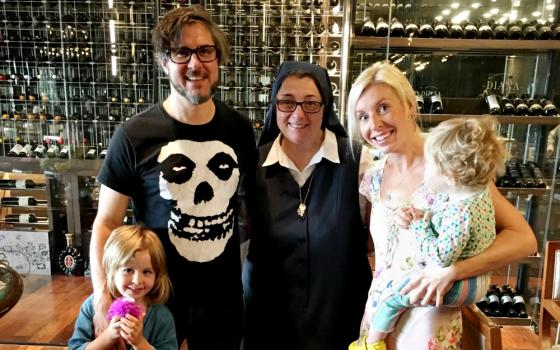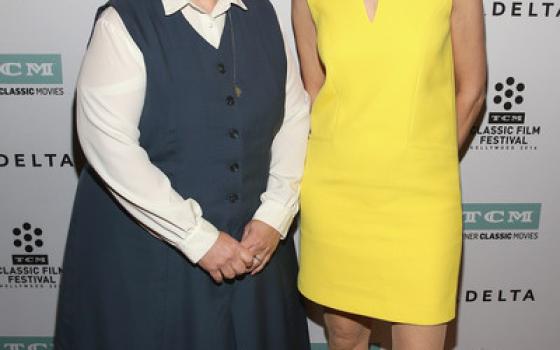Daughter of St. Paul Sr. Rose Pacatte, founding director of the Pauline Center for Media Studies in Los Angeles, has long claimed a special place in the hearts of filmgoers and readers of National Catholic Reporter: She has been a film critic for National Catholic Reporter since 2009 and has reviewed films for St. Anthony Messenger magazine for 15 years.
Pacatte firmly believes theology and film often intersect. In her just-completed dissertation for a doctorate in ministry from the Graduate Theological Foundation in Mishawaka, Indiana, Pacatte was inspired by a quote from the French film critic André Bazin: "Cinema has always been interested in God."
Pacatte's doctoral project, "To Seek God's Face: Theological Approaches to Film," was written as a textbook for undergraduate film students. The study has already received acclaim: Kendra Clayton, president of the Graduate Theological Foundation, awarded Pacatte the institute's Mother Teresa Prize in Spirituality and Community Service for her work, which came with a small cash prize to be used for further study. Pacatte also holds a master's degree in education in media studies from the University of London's Institute of Education.
GSR: How do you "do" film and theology?
Pacatte: Theology means to wonder about God, or as St. Anselm put it, theology is faith seeking understanding. We all search for transcendence and meaning, and stories told through the medium of film often bring all these together. The best films reveal the longings of the human heart for God. And through the journeys people travel to discover transcendent meaning, films reveal the human heart in relation to others. Even if the name of God is not mentioned, the reality is there. So to "do" theology and film, you pay attention to the story, what the story means and how mystery and grace are revealed in humanity, in all of creation.
A perfect example for me was one of last year's Oscar winners, "Three Billboards Outside Ebbing, Missouri." The humanity of the story about people broken yet yearning for healing and forgiveness, anything to assuage the anger, was enfolded in love. It was a truly human story, and therefore, it was truly of the Gospel.
What are you viewing right now and why?
I saw "Mamma Mia! Here We Go Again," and it was much better than I expected! I attended the international press junket for "The Nun," the latest installment of "The Conjuring" horror franchise. Let's just say it will reassure you that the devil exists.
Recently, I've been faced with a lot of superhero movies, and I'm kind of tired of superhero movies. One exception: "Black Panther" is a great movie, and that's because of the women. In a movie about the theme of people fighting exploitation, there is a lot going on with strong women at the center of the story. That is impressive.
What about the religion genre?
So we have "The Nun," which is a horror film that takes place in a Romanian convent in 1952. It is a complete fabrication, of course, and I regret the lack of sound — even realistic — theology that could have made it a better film.
The problem with a lot of films in this genre, particularly about sisters, is the lack of theological depth or nuance. The "Novitiate" film got a lot of attention, but it assumed that a young woman could enter the convent without even being baptized. It made no sense! When something is so fundamentally flawed, I feel like, "Why should I care?" That film looked good, and it was impressively made. But having an unbaptized girl enter the convent and make it to vows? It was a real head-snapper.
I do think, in too many films, there is a Protestant sensibility about religion that misses the theological and sacramental core of Catholicism. A big difference between Catholicism and Protestantism is transcendence. That is so important to Catholics, but it's hard to portray that in film. At the same time, film is a visual medium and often, when films are made about evangelical characters in Protestant churches or settings, suddenly they require Catholic icons!
I thought "Lady Bird" did a good job of portraying sisters in education. The portrayal of the nun who advised Lady Bird was realistic and positive. Too often, the portrayals of nuns are not good to the point where they become clichés. I thought "Lady Bird" got it right.
The baseline for the best portrayal of a Catholic sister in film to me remains "Dead Man Walking."
Then there was that film "First Reformed."
I didn't review it. It's basically a remake of "Diary of a Country Priest" but set in upstate New York instead of France and in the Protestant Christian world rather than Catholic. The premise was a little odd: a small Dutch Reformed Church that merges with a megachurch because of financial reasons. Maybe it had to. It was not a seamless movie, but then, Christianity is not seamless, either, especially in the United States. The film shows, to its credit, that Christianity has to move from the pews to the world, such as caring for the suffering and the environment.
You seem to be suggesting that filmmakers often don't know enough about their subjects when they make religious-themed movies.
The problem is that the filmmakers don't know what they don't know. The consultants or the producers just don't have enough background, and many of them are not even willing to learn what they don't know. So they fall back on familiar tropes and don't ask the right questions.
Certainly, there have been exceptions to this, though?
Martin Scorsese's "Silence," his film about the Jesuits, was fabulous. I did a lot of reviews of that. It was a real tribute to the Jesuits and to the religious fervor that can drive people. But even beyond that, it was a film about the passion of youth not tempered by experience. In the end, it's a film about love, about people who are motivated by love. I've seen the film eight times.
What motivated you to get your doctorate?
I believe in lifelong learning. I think the degree can help me in what I do — from critiquing film, television and popular culture through the lens of Catholic social teaching to living my religious vocation as a Pauline sister in whatever form it takes. And it was a great learning experience. Also, I am the first sister in my province to earn a doctorate. I hope many of our sisters will follow suit.
Do people ever ask you, "How on earth are you a film critic?"
I didn't set out to be a film critic. It just happened!
I always loved movies. They influenced my decision to become a sister — "The Song of Bernadette" and "The Trouble With Angels," especially. When I returned from the U.K. with a master's degree in education in media studies, I started our Pauline Center for Media Studies —PCMS — in Boston to teach media literacy within faith formation. It was 1995, so the first thing I did even before the PCMS was to get online!
AOL soon enough had a journal, and I started reviewing movies there just as a hobby around 1999. At that time, I was co-editing, then co-writing a series of books on film and the lectionary for Pauline Books and Media called "Lights, Camera, Faith!" and watched 250 films in the span of a few short months for the series. I was also on the board of a Catholic communications group, now known as SIGNIS. A Hollywood film publicist offered to let us see a mainstream film at our annual conference, and he did this for several years.
When we moved the PCMS to Los Angeles in 2002, where it doesn't snow and make you cancel events, the publicist invited me to see upcoming mainstream films that would be of interest to the faith community, like "The Emperor's Club," and review it on my blog. I migrated that blog from AOL to Blogspot and then WordPress. I also wrote occasional reviews for the archdiocesan paper, The Tidings.
In early 2003, I was contacted by St. Anthony Messenger and asked to become their film and television reviewer since their current one was retiring. I accepted. My blog is now on Patheos.
Lists of favorite movies are always kind of dangerous, but what would your list include now?
It's true that it's not possible ever to have a consistent list — lists are always changing. But if people ask me what films have impressed me, I always include "The Searchers," which is an attempt to say something beyond the stereotypes of cowboys and Indians. It had a lot to say about misogyny and racism. That film really marked me.
I mentioned "Diary of a Country Priest." When you watch a film like that over and over again and you don't get tired of watching it, that's the sign of a great film. If I see "All the President's Men" on television, I will always stop and watch it. "Meet John Doe" — I could watch that film a million times.
Of more recent films, again, "Three Billboards" really impressed me. Inspired, I thought, by the fiction of Flannery O'Connor, it showed a great interplay between mystery and grace. It was perfection, I thought.
What do you like most about film?
How film externalizes the inner realities of our humanity. This is the sacramental aspect that really calls to me. I love how film enhances our own humanity by telling compelling stories in ways that make me want to be a better member of the human family and live a more meaningful life.
This is what art does. Making art itself is an act of human transcendence. And being a mediator of film for others is an honor that I cherish and a responsibility I take to heart.
When did you start hosting your annual Oscar party, and what do you most like about it?
This is a perfect example of the clash between the life of the church and Hollywood! For the last three years, we haven't had an Oscar party because the Los Angeles Religious Education Congress has taken place on the same Sunday as the Oscars. Because our community is very involved in the congress — book and media display, the film showcase, giving workshops — by Sunday evening, when we get home, we barely have the energy to watch the Oscars.
How do you see the Holy Spirit in your work?
While I cannot claim to have the Holy Spirit on my shoulder, I hope that what I write or how I critique a film reflects the inspiration and action of the Spirit in the world. This is especially true when I can point to grace and mystery in relationships and conflict, the hopes and struggles of humanity on the move toward fulfilling God's intent in creation and God's love in the Incarnation. The Holy Spirit is the best friend of those who make art and those who take it all in and try to figure out what the movie means.
[Chris Herlinger is GSR international correspondent. His email address is cherlinger@ncronline.org.]



